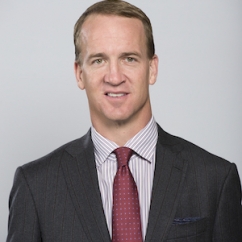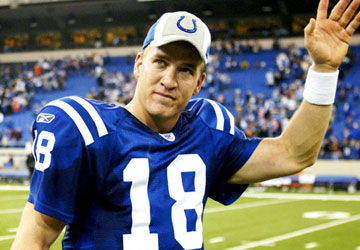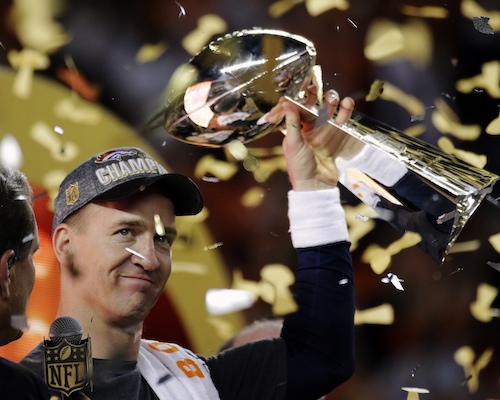Articles and News
Superbowl Legend Manning Tells Jewelers, ‘What Made You Great Before Won’t Make You Great Now’ | March 01, 2017 (0 comments)

Scottsdale, AZ—Speaking to a packed room at Centurion Scottsdale, NFL football legend and keynote speaker Peyton Manning urged jewelers to look ahead and learn to master change.
“The rhythm of my life changed dramatically since retiring last March. There are new expectations I have to get used to, including even from own family.” But he used his own retirement as an example of how business leaders must constantly adapt to a changing world.
“The world morphed by factors out of our control. Nobody is exempt from the pace of change around us. Instead of planning for 10 years, we’re lucky if can keep up with 10 months in front of us. Leaders must be focused on and skilled at things they didn’t have to in the past. Maybe for you it’s succession planning or moving to online, but whatever makes a leader in the future won't be what made them a leader so far.”
Whether in football or jewelry, the goalpost is already shifting, he said. “As leaders, you are expected to crack the code.” Jewelry also isn't that different from pro football, he told the audience. “A quarterback has to master hundreds of plays and thousands of formations. You’re expected to master a changing world and an ever-growing digital presence. You have your own version of real-time decision making. When your industry is disrupted by consolidations, store closings, and challenging transitions, are you able to dig deep and look inside?
“The team you surround yourself with and how you choose to lead it is big part of your individual seasons,” he continued. “Your results are a direct result of how you lead your teams. That's the crucial role of leadership.”
He said one of the most valuable takeaways of his career is that the true value of leadership is the people you surround yourself with. “When you reach for something you never had before, you most likely have to do something you've never done before, or at least do it differently than you've done it in the past. Successful reinvention is very hard to do alone, but very different when you do it with teammates. The NFL awards the Lombardi trophy, but in those moments, it's about remembering the power of the team that made it possible for us to stand on that mountaintop.”
Nobody starts out as a leader, he said. Whether quarterback or CEO, you must earn the title of leader and to do that, you must influence others. Leadership is tale of two emotions, anxiety and bravery.
“I learned my first lesson in leadership the hard way,” he shared, calling it an epic failure. “The University of Tennessee was in the Rose Bowl playing UCLA. My father [legendary quarterback Archie Manning] said, ‘if you ever get into a huddle with the stars at any point in season, it’s probably going to be fourth quarter in a blowout, but it still doesn't matter, you take charge of that huddle!’
I did, and I said, ‘I know I'm just a freshman, let's go down the field and get a touchdown!’ A big receiver said, ‘Hey freshman, shut the blank up and call the blanking play!’”
Leaders also learn to manage hardships, he said. “You have to be able to pivot and remain nimble enough to take what life throws at you. I never pivoted that easily and was never called that nimble, but my vision was always to compete against the very best and do it at the highest level possible. When you are competitive and want to win, it feeds your actions.
“In intense competitions, we all face tests of our skills and heart. Those who believe setbacks are blessings in disguise, well, they're very well disguised! But they are catalysts for change,” he said.
“When I was drafted first by the Colts—the worst team gets first pick—we lost [the season] 3-13. I had the worst record for interceptions for a rookie, and I still have that record. When the coach asked why I didn’t throw the ball, I said ‘nobody was open. The window was this small (holding his hands a foot apart).’ The coach said, ‘In the NFL, that's open.’ I had to adapt.”
Adapt he did. As the only five-time MVP in the National Football League, and a 14-time Pro Bowl pick, Manning described himself as a demanding teammate but a fair one.
“My wide receivers throughout the years enjoyed when I got reprimanded by coaches. In watching films of practice, if I threw the ball without coverage, the coach said, ‘This is greedy and going to hurt us on Sunday. You’ve got to make better choices than this.” At the end of each season, Manning said he would measure himself against his personal goals and the team goals.
2011 was a year Manning said he’d like to erase, but he acknowledges it was an important step in winning last year's Superbowl with the Denver Broncos.
“After four neck surgeries kept me on the sidelines for an entire season, coming back as quarterback seemed impossible. The Colts and I parted ways, and I went to Denver. I won the NFL Comeback award—not one I ever wanted to win,” he said.

After 14 seasons, the Colts released Manning after the 2011 season, which he spent on the sidelines with injuries.
“As a leader you have to prepare for wide range of inevitabilities and put in extraordinary effort for them to come off. Last year I had to get used to new team changes: new coaches, a new offensive system, and I had to entirely retool myself to deal with them. When you're in an offensive system a long time, you master that system. In my old system I could back up and throw a pass and close my eyes and know where the receiver was. Now I had to entirely retool. I knew I couldn't throw the 55-yard passes I had in the past; my injuries had caught up, but I had to look at my team and identify strengths and weaknesses and adjust.”
Manning also described how adversity helped him grow as a leader. “For the first time since college, I was no longer a starting quarterback because of my injuries.” He took his challenges one at a time and set goals week by week, he said. The first week, he let his injury calm down. The second week, he ramped up his rehabilitation. By the third week, he was throwing indoors by himself. He couldn’t travel with the team but he’d send his teammates good luck texts or congratulations texts, and he was not allowed on the sidelines in a cast so he’d put the TV on mute in the locker room so he could hear the crowd roaring.
“Was I still leading my team or thinking I was? Was I going through the motions for my benefit and the team was moving on? But the best I could do was go through motions,” he said. “When my teammates saw me push through excruciating rehab, and in meetings taking notes, it set standards and my teammates had my back. I gave them every reason to trust that I would lead my team to accomplish my goal.
“I was well enough to start practicing and I told the coach I was available. I was able to be the backup quarterback for the last game of season, and in the second half I was back out there. I had to adjust, but I was out there. By the time we got to San Francisco, we got out and got the lead and were victorious.

Peyton Manning hoists the Vince Lombardi trophy after the Denver Broncos' Superbowl win. Image: Knoxville News Sentinel.
“As the clock ticked down, I remember high-fiving my linemen down the line. I was celebrating them and my family at that moment. It was captivating to know we won the championships. I can't escape the sting of losing two championships, but I remember what it was like in San Francisco, just like I did in Miami, to hand that trophy down to my teammates to put their hand on the symbol of our efforts before passing it to the next teammate. It was the value of something we did together; it was the public and private sacrifices my teammates and I put in that culminated in that victory.”







